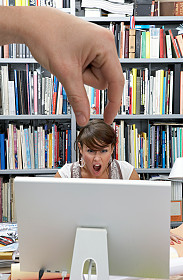Recently I listened to Joe Queenan—author of a book about his love of books and reading—on NPR (the soundtrack of my life) eager for the pleasure of hearing someone who reads as voraciously (okay, more) as I do, and loves books as intensely (not possible that it could be more) and who, like me, is obsessed with reading.
So I settled in (as much as you can “settle in” while cleaning the bathroom) ready to share my menial task with this fellow-book-lover. I’d only heard of him in the most peripheral of ways, but I was ready to love him. Ready to buy his book. Ready to shout it out—because when I love a book, I tend to go on and on until I bore people into buying the damn thing just to shut me up.
And then I heard: “Libraries kind of depress me and part of it is because you know you can’t read all of the books that they have, but a lot of it is because libraries used to have some kind of way of putting the kind of Graham Greene and Charles Dickens and Jane Austen stuff in one category, and then they’d have like Daphne Du Maurier and people — but they wouldn’t have the actual trash mixed in. And now it’s all just one big maul and it’s kind of depressing because most of the books you see in the library shelves are terrible books.”
Was he being cute?
No. I think he thought he was being clever. Or wise. Or perhaps he is clever; perhaps he’s the sole and only arbiter of taste librarians should use for recommendations.
Maybe he’s the smartest guy in the world. But I don’t think so. I think Joe wasn’t taught the lesson my grandmother passed on : Make sure the rocks in your head match the holes in his. Okay, she was talking about husbands, not books. But it works for books. One woman’s passion is another woman’s gruel.
And passion alone doesn’t make your choice grander. Not even if you’re Joe.
Libraries practically raised me. Libraries saved my life. Libraries were the only place I could get books for the longest time—cause the money wasn’t there.
Next he came out with why he doesn’t like bookstores. I don’t need to quote it, but it boiled down to “they were horrible to me.” However, compared to what he said about book clubs, he’s having a love affair with libraries and bookstores.
Joe on book clubs:
“They’re just stupid. They’re just ridiculous. I mean, my problem with book clubs, part of it is one week they discuss something like “Anna Karenina” and “War and Peace” and the next week they discuss the stupidest book imaginable. They just discover whatever book, you know, Anita Shreve just happened to write or something like that. It was like – there’s no theme to your pudding here.”
I thought of taking out Anita’s name above—but you might as well substitute my name (not that I have her fame. I only wish!) or any of a binder full of women authors. We get the message, Joe.
Would you prefer we stop writing, or are there some guidelines to an acceptable book you can send us?
Everyone has favored authors; preferred styles of books. Not everyone, however, uses their opinions as a vehicle to destroy or denigrate others. Was he being ironic? Smart-alecky? I really couldn’t tell except for one surety: he came across as mean.
I love book clubs. I’ve had the pleasure of meeting with many—though not as many as I’d like. Women in book clubs are smart, funny, busy, book-loving, interested, committed readers who enjoy each other’s company and read plenty and widely—in and out of their clubs.
Joe, you’ve inspired me to work my hardest to get my novels to more book clubs, more women—to increase our numbers and fight against MM’s (mordant misogynists).
In honor of Joe, I think I’ll set up the sort of give-away that I’m certain he’d find distasteful, filled with references to Wine! Cheese! Crackers!
God forbid . . . fun mixed with reading.
It’s probably just the kind of “stupid,” “depressing” and “ridiculous” effort Joe would hate. I’m guessing he won’t enter.
Hey, Joe. I love books. And I’m glad we share that love.
And I also love readers. It doesn’t matter to me what they’re reading. I don’t care if it’s Tolstoy, and I don’t care if it’s Fifty Shades of Anything. Reading is for pleasure, for escape, for joy, for depth, for learning—for anything from escaping poverty to becoming a philosopher.
But what it’s not? It’s not for me to judge what makes readers happy. It’s not for me to idealize them because they read only from one slice of the Library of Congress. Because actually, reading is a very solemn and private affair, whatever book you’re lucky enough to hold.
